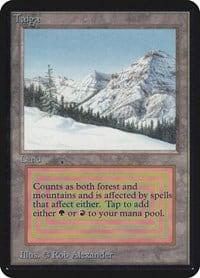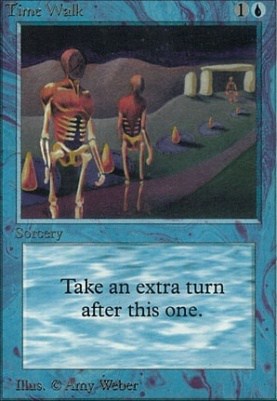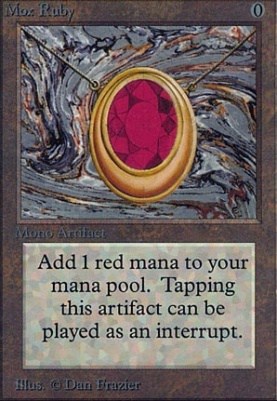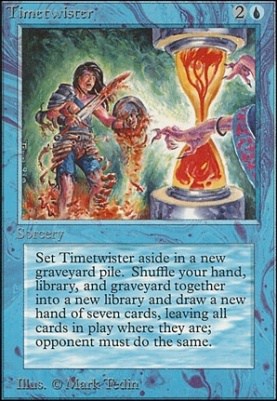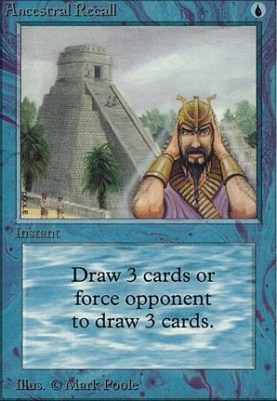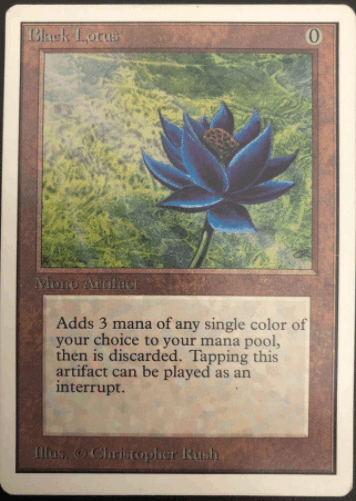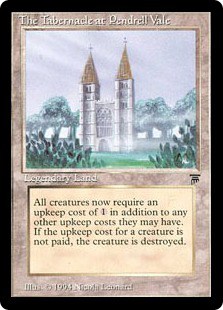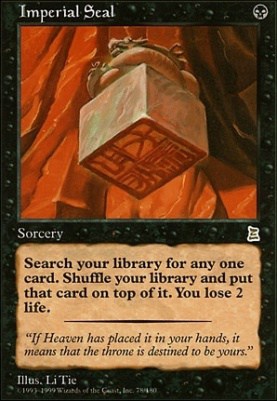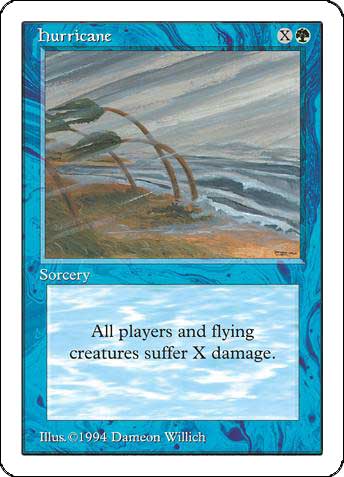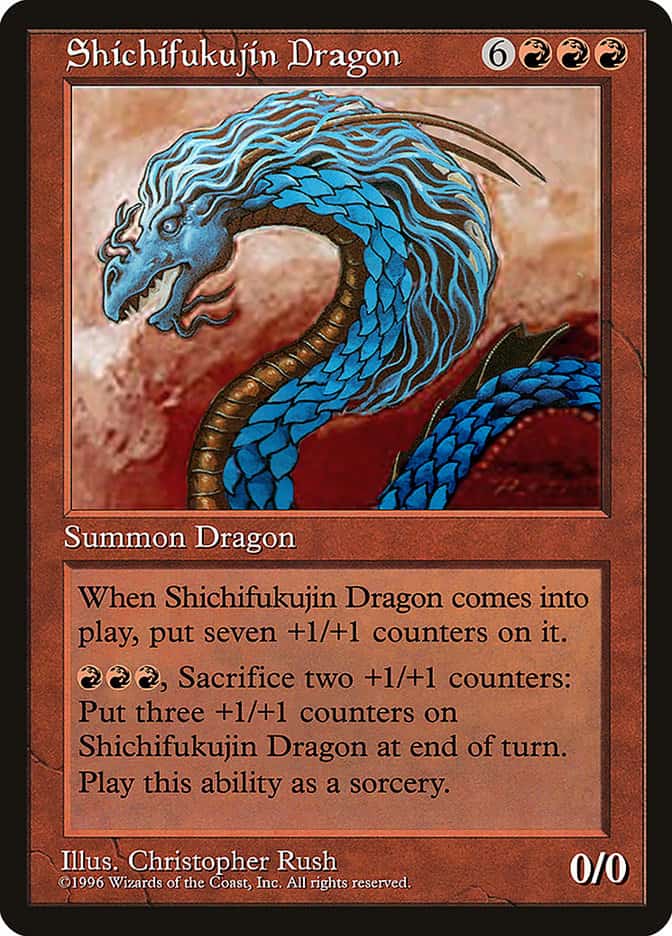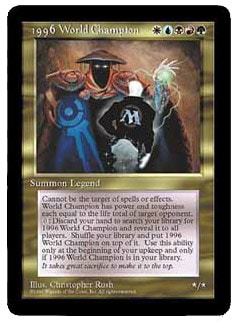Parent company Wizards of the Coast, which also owns Dungeons and Dragons, debuted the Magic the Gathering card game in 1993 with the Limited Edition Alpha Set. This set would become one of the most iconic and coveted to date, featuring the especially desired “Power Nine,” a group of cards with impressive strengths that have since been banned from most tournaments. The basic concept of Magic the Gathering is simple enough: each card represents a move that challenges your opponent’s life points. Variations have been created for more interesting and challenging gameplay as have a plethora of super rare and powerful cards. Read the list below to learn about some of the most unique (and expensive) Magic Cards ever made.
- Taiga
- Time Walk
- The Mox Cards
- Timetwister
- Ancestral Recall
- Black Lotus
- Tabernacle at Pendrell Vale
- Imperial Seal
- Blue Hurricane
- Shichifukujin Dragon
- 1996 World Championship

photo source: Tcgplayer.com
Taiga is part of the original 1993 Magic the Gathering Limited Edition Alpha deck, which only had a 2.7 million card run. It functions as both a forest and mountain landscape so spells meant to affect either work with this card. It also adds mana. The card features a snowy mountainscape with pine trees.
Did you know
A taiga is a moist arctic forest that starts at the end of an icy tundra.

photo source: Cardkingdom.com
Time Walk was one of the cards from the Alpha deck. It allows players to take an extra turn at a low cost and, as a result, is banned in most tournament settings, except for vintage, where it is restricted. It is part of the Power Nine, a group of original Magic Cards with disproportionate abilities that don’t require combos to be lethal. All of the Power Nine cards are also part of the Reserved List, a group of cards Wizards of the Coast will never reprint in their original format. The card features several partially skinned skeletons walking on a path that leads to a stone structure.
Did you know
A later edition of Time Walk features a figure standing on a giant glowing disk.

photo source: Cardkingdom.com
The five original mox cards make up the majority of the Power Nine. Each mox is a distinct jewel that provides the users with mana of the corresponding color. Their power comes from the ability to play multiple mox cards in a single turn, which can give the player a ridiculous advantage over their opponent in terms of mana. The cards are only allowed in vintage editions of the game on a restricted basis. The original mox cards include emerald, pearl, jet, ruby and sapphire.
Did you know
Magic the Gathering creators derived the term “mox,” which refers to specific jewelry in the game, from the term “moxie” which means courage or determination.

photo source: Cardkingdom.com
Timetwister is part of the original 1993 Alpha set that introduced Magic the Gathering to the World. The Timetwister is also part of the Power Nine. Timetwister makes both players draw seven cards while simultaneously draining the opponent’s mana. It is only allowed to be freely played in the Commander format of the game.
Did you know
Artist Mark Tedin designed the card, among others. In fact, Wizards of the Coast was his first client.

photo source: Cardkingdom.com
Ancestral Recall is part of the Power Nine and original Alpha Deck. It was first intended to be a common card, meaning that there would be several printed and available. However, its powerful abilities made the creators rethink and switch it to rare. It allows the player to draw three cards or forces their opponent to draw three without any losses to the owner. It’s only allowed in Vintage tournaments in a restricted capacity.
Did you know
Vintage tournaments allow almost all “problematic” cards to be played.

photo source: Oasis Games via TCG Player
The Black Lotus is one of the most powerful and rare cards in Magic the Gathering, with only 1,100 originally produced. It comes from the original 1993 Alpha Set and is a part of the Power Nine. The Black Lotus gives the player more mana, which they can use to generate spells and summon helpful creatures against their opponents. The card features a black border and an image of a black lotus flower in a patch of grass.
Did you know
The $166,100 auction sale more than doubled the Black Lotus card’s value.

photo source: Magic the Gathering
The Tabernacle at Pendrell Vale is part of the 1994 Legends set and on the reserved list so it will never be reprinted in the same format again. It allows the user to manipulate the other player’s creatures and, potentially, destroy them. Its art features a castle in a misty scene. Some reports state that there are fewer copies of the Tabernacle card than the Black Lotus, but it’s less valuable because it doesn’t have the same icon status.
Did you know
There is an Italian edition of the card.

photo source: Cardkingdom.com
Imperial Seal is part of the 1999 Portal Three Kingdoms deck, which was only produced for the Asian market and, as a result, is extremely rare in the United States. Imperial Seal can allow players to play extra copies of Vampiric Tutor card. As a result, it is restricted and even banned in most standard tournaments. However, it can be used freely in the Commander format of the game. The art, designed by Li Tie, features a massive stone seal being lowered in a stone cave or some other natural structure.
Did you know
Artist Li Tie also designed the Poison Arrow card and the Stronghold Discipline card.

photo source: Magic the Gathering
Blue Hurricane is rare because it was a misprinted version of a card designed for the unreleased Summer Magic Deck in 1994. Originally meant to be green like the rest of the deck, the card has a blue background. Ultimately, Wizards of the Coast decided to stop the sets from being shipped out due to a number of other errors, but a few slipped under the radar. Besides the misprint, the card shows a tropical hurricane scene and causes all players and flying creatures X damage.
Did you know
Blue Hurricane was not the only issue with this deck. Some of the colors were too dark and the artwork credit was not updated.
Cost: Irrelevant
Deck: None
Type: Summon Dragon

photo source: Scryfall
Wizards of the Coast created the Shichifukujin Dragon card as a way to commemorate the building of the Duelists’ Convocation International Tournament Center in Tokyo. It was created as an homage to Japan; Shichifukujin is a Japanese deity for luck. While several versions of the card were printed for testing purposes, Wizards of the Coast destroyed all but one. It lived in the Tournament space until 2003, when the building closed, and can now be visited in the Japanese Hobby Offices.
Did you know
The card’s art is featured on various Magic Properties and decks, but the physical copy is unique.
Cost: $17,500
Deck: None
Type: Summon Legend

photo source: Magicuntapped.com
The 1996 World Championship is the rarest Magic the Gathering card. It was a special edition one of a kind card made specifically for the winner of the entire competition. Every other version of the card was destroyed. It was awarded to Tom Chanpheng from Australia, who beat Mark Justice with a surprisingly weak deck. The card features a cloaked creature performing a spell to create a mysterious figure donning a Magic the Gathering sweatshirt. The description praises the champion and asserts that the owner “cannot be the target of spells or effects.”
Did you know
Chanpheng sold the card in 2001 for $17,500.

